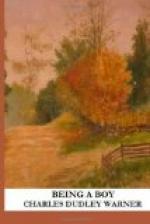No other boy knows how to appreciate a holiday as the farm-boy does; and his best ones are of a peculiar kind. Going fishing is of course one sort. The excitement of rigging up the tackle, digging the bait, and the anticipation of great luck! These are pure pleasures, enjoyed because they are rare. Boys who can go a-fishing any time care but little for it. Tramping all day through bush and brier, fighting flies and mosquitoes, and branches that tangle the line, and snags that break the hook, and returning home late and hungry, with wet feet and a string of speckled trout on a willow twig, and having the family crowd out at the kitchen door to look at ’em, and say, “Pretty well done for you, bub; did you catch that big one yourself?” —this is also pure happiness, the like of which the boy will never have again, not if he comes to be selectman and deacon and to “keep store.”
But the holidays I recall with delight were the two days in spring and fall, when we went to the distant pasture-land, in a neighboring town, maybe, to drive thither the young cattle and colts, and to bring them back again. It was a wild and rocky upland where our great pasture was, many miles from home, the road to it running by a brawling river, and up a dashing brook-side among great hills. What a day’s adventure it was! It was like a journey to Europe. The night before, I could scarcely sleep for thinking of it! and there was no trouble about getting me up at sunrise that morning. The breakfast was eaten, the luncheon was packed in a large basket, with bottles of root beer and a jug of switchel, which packing I superintended with the greatest interest; and then the cattle were to be collected for the march, and the horses hitched up. Did I shirk any duty? Was I slow? I think not. I was willing to run my legs off after the frisky steers, who seemed to have an idea they were going on a lark, and frolicked about, dashing into all gates, and through all bars except the right ones; and how cheerfully I did yell at them.
It was a glorious chance to “holler,” and I have never since heard any public speaker on the stump or at camp-meeting who could make more noise. I have often thought it fortunate that the amount of noise in a boy does not increase in proportion to his size; if it did, the world could not contain it.
The whole day was full of excitement and of freedom. We were away from the farm, which to a boy is one of the best parts of farming; we saw other farms and other people at work; I had the pleasure of marching along, and swinging my whip, past boys whom I knew, who were picking up stones. Every turn of the road, every bend and rapid of the river, the great bowlders by the wayside, the watering-troughs, the giant pine that had been struck by lightning, the mysterious covered bridge over the river where it was, most swift and rocky and foamy, the chance eagle in the blue sky, the sense of going somewhere,—why, as I recall all these things I feel that even the Prince Imperial, as he used to dash on horseback through the Bois de Boulogne, with fifty mounted hussars clattering at his heels, and crowds of people cheering, could not have been as happy as was I, a boy in short jacket and shorter pantaloons, trudging in the dust that day behind the steers and colts, cracking my black-stock whip.




